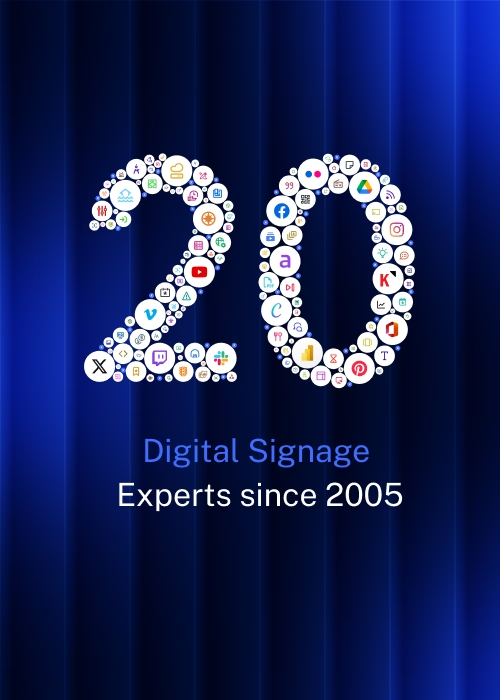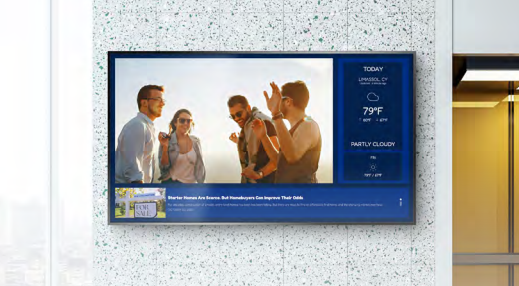It's Not The Content, Stupid | Content Automation for Digital Signage
Digital signage has proven itself as a high impact medium that gives us the power to communicate more effectively with dynamic and engaging messaging.
Unfortunately, what many business owners don’t realize is that simply slapping a picture on the screen isn’t enough to produce an ROI.
Value generating digital signage relies on a steady supply of fresh content to keep viewers interested.
Naturally, this content will make or break a digital signage strategy.
The Content Challenge when our Attention Span is less than that of a Goldfish
Uninspired digital signage content strategies won’t deliver the financial returns that make their use worthwhile.
We’re already inundated with advertising in our daily routines, and most people get good at phasing out the “white noise” of the same ads being displayed over and over. Similarly, this idea is rooted in human psychology and applies to whomever you’re targeting with your digital outreach—employees, customers, guests, etc.
The same content displayed ad nauseum not only fails to keep the interest of an audience over time, but actually loses potential revenue.
A Penn State paper spoke to this drawback. When we experience sensory overload from too much stimuli in our daily lives, we begin to filter out the information we view as “nonessential/fluff.” Above all, this includes the unchanging displays and ads that we see every day.

We also lose interest fast. A Microsoft study found that our attention spans are decreasing—from 12 seconds in 2000 to 8 seconds in 2013. This is even less than the 9 second attention span of a goldfish!
So what's the point?
The point is businesses are losing out on qualified customers by presenting static and boring ads that they automatically filter out. And those that invest in digital signage without the appropriate content strategy are missing the true value of their advertising.
Investing in Content
The price of digital signage has reduced dramatically, but it’s still a significant investment. Businesses however tend to over-prioritize technology spend while neglecting to invest in content strategy.
In other words, these businesses have it backwards.
The goal of digital signage is engagement. Viewers don’t interact with the technology. They interact with the content. Prioritizing a greater investment in content creation is the first step in unlocking the true power of digital signage.
That being said, simply throwing money at content creation without a plan in mind isn’t the answer, either. It’s not just content that drives digital signage value; it’s fresh content.
The problem is, generating fresh material consistently is tough. And trying to update content manually is time-consuming and labor intensive.
So how can digital signage champions create a stream of fresh content for their digital signage strategy without devoting back-breaking amounts of manpower to the process?
Automated content is the answer.
Content Automation for Digital Signage
Automating your content is the secret ingredient to a value-driving digital signage strategy.
Simply put, it involves integrating internal and external data into a digital signage CMS. The CMS then displays this data in a visually arresting and easily digestible format.
The idea behind content automation is that this data is already being entered once into a data source that lives outside the CMS. Meaning, there is no need to re-enter it for the digital signs. When the data source is updated, the data on the digital signage displays is also automatically updated.
That singular task of entering and updating content once is what gives content automation its competitive edge—small inputs of employee manpower generate significant improvements in content visibility.
When structured correctly, content automation for digital signage instantly solves the dilemma of displaying regular, fresh content without the financial drawbacks. It rids businesses the worry and expense of "producing” each message on their displays.
Content automation also excels at getting around the “white noise” filtering phenomenon that plagues stale traditional signage. The Microsoft study mentioned above also found that consumers pay more attention to digital screens (duh!). This increased tech adoption and social media usage are training consumers to become better at processing. As well as encoding information through short bursts of high attention. Content automation leverages that inclination to better process fresh and relevant information on digital screens, to keep the attention of viewers.
Two Sides of the Content Automation Coin
Content automation for digital signage includes the data layer and the visualization layer.
Data Layer
Firstly, the data layer involves the actual data, or content, being displayed to the audience. Therefore, depending on the organization, the data layer may include:
- Internal Reporting
This includes Key Performance Indicators (KPIs) such as sales, profits etc.- In a retail setting, KPIs would include sales per employees, financial goals, store performance, turnover, customer satisfaction etc.
CRMs can share pipeline reporting, goals, and retention reports. - For manufacturing, KPIs include production metrics, inventory management, product quality, worker-performance, machine performance, quota tracking, safety incident reports, production line status updates, and labor costs.
- In a retail setting, KPIs would include sales per employees, financial goals, store performance, turnover, customer satisfaction etc.
- External Data
External data includes public transit schedules, flight information, weather, traffic, social media, emergency or CAP alerts etc.
This data is already on a spreadsheet or software system, and simply needs to be repurposed into well-designed signage content.
Visualization Layer
Secondly, the automation coin is the visualization layer. In other words, this is how the data layer will appear to viewers. Basically, how will the content/data look like when it is on a digital signage screen?
Elements of visual design and aesthetic appeal come into play for this layer. Above all, package and display content in ways that are easy for audiences to see and internalize.
This visualization process is aided by the use of digital signage apps and content widgets in a CMS.
For example, displaying a calendar of events on a digital signage screen.
An event listings widget pulls event info from a calendar e.g Google or Outlook Calendar, injects the info into a graphic presentation and displays it on a screen.
The event listings widget turns this...

...into this

In other words, another great example is displaying KPIs such as sales on a digital signage screen.
An analytics widget will transform raw data in a CSV, JSON or XML file into a vibrant display of charts and graphs.
It turns this...

...into this

For instance, these digital signage widgets and apps convert data from internal and external sources into vibrant graphical presentations that are easy on the eyes, and easy to understand.
Automating Digital Signage Success
Digital signage apps and content widgets are a revolutionary way to automate content delivery and ensure that screens are always displaying fresh material.
Therefore, leveraging these apps and content widgets is the easiest way to customize a regular flow of relevant material for any digital signage strategy.
Combining the efficiency of technology with a well-funded content strategy that involves content automation is the only way to automate digital signage success.







